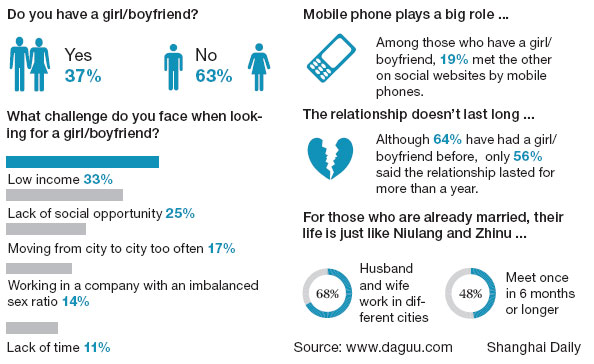No love in the air for migrant workers
 0 Comment(s)
0 Comment(s) Print
Print E-mail Shanghai Daily, August 24, 2012
E-mail Shanghai Daily, August 24, 2012
Qixi Festival, or Chinese Valentine's Day, is not exactly a happy occasion for the city's young migrant workers as a survey shows that a majority of them find it difficult to find love or sustain a love affair.
 |
|
No love in the air for migrant workers |
Up to 63 percent of young migrant workers are single, many citing factors such as lack of communication channels, low income and unstable work locations that hamper them from having boyfriends or girlfriends, according to a survey released yesterday by Daguu.com, an online job-hunting platform. Nearly 19,000 migrant workers, with an average age of 23.6 years, took part in the survey.
"I can only save about 1,000 yuan (US$157.322) each month and share a room with several others that allows little privacy," Yuan Lin, 18, a woman from southwest China's Sichuan Province, told Shanghai Daily. She currently works as a hostess in a local hotel and has only returned home to meet her family and boyfriend once in the past two years since starting work. Many migrant workers share a similar dilemma. They miss their family and lovers in other cities but they also need to control their expenses, so that they can save more. "I am under heavy pressure and confused about the future of our relationship," Yuan said. The couple only talked online or on the phone. "We have broken up and been back together many times. There's great instability in our relationship," she conceded.
The survey showed that 44 percent of unmarried migrant workers said their past relationships broke up in less than 12 months, including 18 percent who separated within just three months.
Factors such as quick change in jobs from city to city, extensive working hours and shortage of channels to meet people make it difficult for them to find partners, the survey said.
Up to 33 percent of unmarried respondents attributed their single status to economic reasons: they include 12 percent who said their income was too less to support a stable relationship while the rest 21 percent felt that people in Shanghai have high materialistic expectations of their lovers.
"Everything costs money in Shanghai! You should set aside at least 200 to 300 yuan to take a girl out for a nice dinner. That means you lose that much from your savings," said a 22-year-old man, surnamed Chen, from the central Henan Province. And conditions at Chen's work place are not at all conducive to pursuing love. He said there are no female workers at his suburban steel-forging factory, not to mention their busy work schedule. "All I can do is continue saving more to prepare for a relationship and wait patiently."
Up to 14 percent of single workers blamed the extremely imbalanced gender ratio for their predicament. A lot of migrants work in heavy-industrial companies and factories where female laborers are very few.
Compared to singles, the biggest problem for married migrant workers is the long distance and few opportunities for face-to-face communication with their loved ones. Nearly 70 percent of married migrants in Shanghai don't live with their spouses.
"I feel quite lonely here," said Cao Zhengquan, 40, who is a security guard at a foreign company and has been working in Shanghai for 18 years.
Cao's wife and 16-year-old daughter live in his hometown in Sichuan. Cao said he only returns home once a year to control traveling cost and save more. "We have conflicts all the time. But I can only calm her down on the phone," said Cao, who has been married for 20 years. He said they are still together only because of their little girl.





